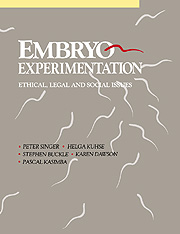Book contents
- Frontmatter
- Contents
- Foreword
- ACKNOWLEDGEMENTS
- INTRODUCTION
- PART 1 THE SCIENTIFIC ISSUES
- PART 2 THE ETHICAL ISSUES
- ARGUMENTS ABOUT THE STATUS OF DIFFERENT DEVELOPMENTAL STAGES
- ARGUMENTS FROM POTENTIAL
- EMBRYO RESEARCH AND WOMEN
- PART 3 CONTROLLING EMBRYO EXPERIMENTATION IN A DEMOCRATIC SOCIETY
- FORMING A PUBLIC POLICY
- 13 Community control of IVF and embryo experimentation
- 14 IVF regulation: The search for a legal basis
- 15 Self-regulation and embryo experimentation in Australia: A critique
- 16 Public policy in a pluralist society
- LEGISLATION AND ITS PROBLEMS
- APPENDICES
- GLOSSARY
- NOTES ON CONTRIBUTORS
- INDEX
16 - Public policy in a pluralist society
Published online by Cambridge University Press: 05 June 2012
- Frontmatter
- Contents
- Foreword
- ACKNOWLEDGEMENTS
- INTRODUCTION
- PART 1 THE SCIENTIFIC ISSUES
- PART 2 THE ETHICAL ISSUES
- ARGUMENTS ABOUT THE STATUS OF DIFFERENT DEVELOPMENTAL STAGES
- ARGUMENTS FROM POTENTIAL
- EMBRYO RESEARCH AND WOMEN
- PART 3 CONTROLLING EMBRYO EXPERIMENTATION IN A DEMOCRATIC SOCIETY
- FORMING A PUBLIC POLICY
- 13 Community control of IVF and embryo experimentation
- 14 IVF regulation: The search for a legal basis
- 15 Self-regulation and embryo experimentation in Australia: A critique
- 16 Public policy in a pluralist society
- LEGISLATION AND ITS PROBLEMS
- APPENDICES
- GLOSSARY
- NOTES ON CONTRIBUTORS
- INDEX
Summary
What is the proper relation between the moral principles that should govern public policy, including legislation, and moral principles which may be held—often passionately—by individuals, including individual legislators? The adherents of such ‘personal’ principles often object that proposed laws would allow people, or even compel them, to transgress the principles. Obvious examples are homosexuality and abortion law reform. People who think homosexuality an abominable sin object to the repeal of laws that make it a crime; and those who think that abortion is as wrong as murder of grown people object that a law permitting abortion in certain cases might make it permissible for other people to—as they would say—murder unborn children, or even, if they are nurses and want to keep their jobs, compel them to do so themselves.
So the question we have to consider is really this: what weight ought to be given to the objections of these people when framing and debating legislation and policy? We live in a pluralist society, which means that the moral principles held sacred among different sections of society are divergent and often conflicting; and we live in a democratic society, in which, therefore, policy and legislation have to be decided on by procedures involving voting by all of us or by our representatives; so the question becomes: what attention should we pay, whether we are legislators in parliaments or simply voters in a constituency, to the personal moral opinions of other people, or even to our own?
- Type
- Chapter
- Information
- Embryo Experimentation , pp. 183 - 194Publisher: Cambridge University PressPrint publication year: 1990
- 1
- Cited by

